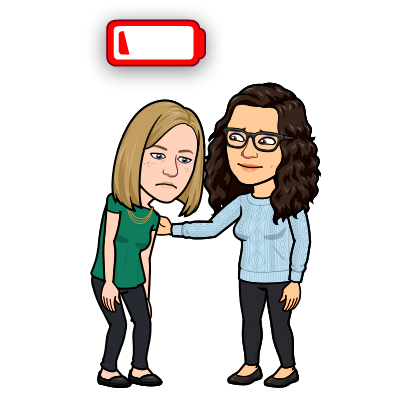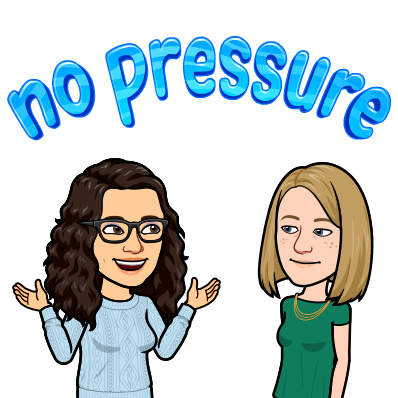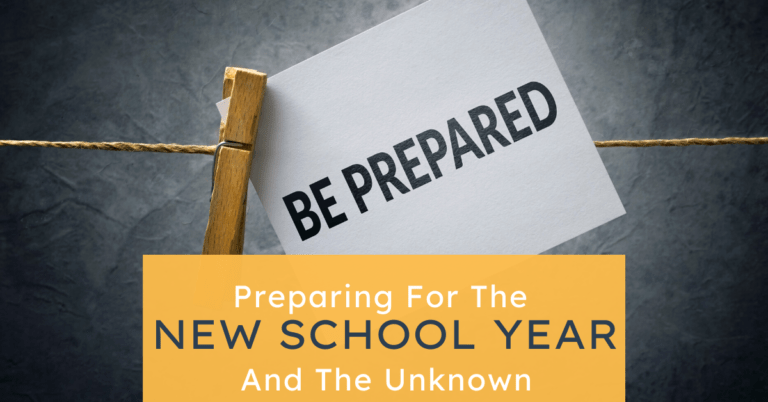[podcast_subscribe id=”7428″]
In this episode, we are talking all about how chaotic this school year has been so far. We will share some of the things that are making it feel so exhausting, while also brainstorming some ways that we can improve our daily teaching lives.
If you like what you hear, we would love it if you could share this episode with a colleague or friend. And make sure you subscribe so that you don’t miss out on any new content! And consider supporting the show by buying us a coffee or two!
We would love to hear from you – leave a comment on our website OR check out our FLIP!

Show Notes
This week, we are chatting a little bit about how things are going in general this school year, and how teacher tired we are already.
There have been a lot of conversations, both in-person and online, about how so many are feeling May tired already this school year. This is not a good sign because our end-of-school-year exhaustion should not be happening only a month into the year!
This is certainly a scary way to start up the school year. It has been such a chaotic start up. Rachel is just coming back to the classroom from a board level position, which could account for some of the chaos that she is experiencing. That being said, Katie has been in the classroom and it still feels pretty busy and exhausting.
Why are we so tired?
There are a lot of new and different things happening all at once, which could be contributing to this exhaustion. That being said, it’s important to think about all of the different things going on, and how they are affecting you.
New student information system (SIS)

The first factor that has impacted teacher fatigue is a new student information system (SIS) in our Board. This alone has created so much chaos around how we view IEPs, and it has even affected school busing for new students. Data is not syncing they way it should, which means the bus company isn’t receiving accurate information about students’ eligibility, which then makes it challenging to get students to school. The back and forth between all of the different parties involved (school, Board, Welcome Centre, bus company, etc.) has been an added stress.
The implementation of this student information system alone has contributed quite a bit to the chaos of start up this year.
Lots of newcomers!
Beyond that, Katie has felt busy in her program area in particular. She teaches newcomers English, and it has felt as if immigration to Canada has opened up again. More people are arriving, and students have been arriving all throughout September, and even into October. It feels like every day or so, new students are arriving, and many are just starting their English language journey. This has made things very challenging because it feels like a start and stop every few days to make sure all students feel welcome and make sure they are adjusting to the class and school well.
Rachel is teaching ESL science this year, and she has found that this course has been a source of chaos as well for this exact reason. New students are joining the class all the time, and it’s only settling now after a whole month! Plus, with many students having a lower English proficiency level, it makes it much more challenging to learn science, which has a language of its own.
It feels more chaotic, in particular, because we would love the opportunity to be able to sit down with some of these late arrivals or students with lower language proficiency levels to help support them more effectively, however it isn’t always possible to do so.
That being said, despite the chaos and steady stream of students, we are seeing changes and development in our students. While it is challenging to support everyone, it’s worth the effort overall.
This year has also shown a huge shift in the languages and cultures of our students this year. It has been amazing to see all of the different language and culture groups interacting and building friendships with one another. It has really helped them to build their English skills so that they can communicate more easily with one another.
We have seen a big influx of students from Ukraine and Afghanistan, as well as other areas of the world, and with them they bring a wide range of emotions and lived experiences. This has made it quite difficult.
For many of our students that had to flee their country, there is this frustration about having to start over and learn a whole new language, plus they have had to leave their home and their future plans.
This has also created some difficult emotions for us as educators. Many students make closer connections with their ESL programming teachers, as the class sizes are typically a bit smaller, and it tends to be a different style of teaching overall. In ESL, Katie is able to use their hobbies, interests, etc. to help them build English skills, so the course feels more personal, which then helps to build trust, and allows students to share or ask for help if needed.
While this program area and the work with students is super rewarding, it is still challenging, and can be very difficult emotionally to support these students that have come from some really challenging and often traumatic circumstances.
Tired is definitely how we would describe our current state as educators. We still arrive every day and try our best to be energetic and positive for our students, but it’s extremely draining.
Getting back to pre-covid organization
Some of Rachel’s tired is also coming from the fact that science labs hadn’t really been as involved throughout covid, and so now the labs, materials, etc. are not in the most organized state. It has taken a lot of time to organize and bring things back to where they should be, ordering chemicals, and getting everything caught up! This has definitely sucked up a lot of her time and energy, and has eaten into the prep time during the day, which then leads to the use of the evenings and weekends for prep.
New classroom formats
Another reason we are likely more tired this year is because we are busier in our classrooms! Changing to a mastery-based learning model requires a lot of front-load planning, but then it also means we are busier in the classroom supporting students that need that extra help. It is so much busier and requires much more energy in order to do mastery checks, one-on-one conferencing, small group instruction, labs, etc. It’s chaos in the classroom, but it’s intentional and purposeful chaos. This busy energy is great, but it is also exhausting, particularly for introverts like us!
How do we address teacher fatigue?
Part of why we are recording this is because we are wondering how we can turn this around? How can we move forward without continuing this cycle of wearing ourselves so thin that we are not effective anymore as educators?
We have to lean on each other

Something that has pulled Rachel through the first few weeks has been that she and her course team have really leaned on one another and supported each other with planning and resource creation. This has saved a lot of time and stress that would make it feel so much more impossible.
We need to reach out to our colleagues and course teams, and give one another permission to slow down a bit! With mastery-based ESL programming, Katie and her team have had to slow down a bit on implementation, which was a difficult decision, because the steady stream of students was making it really difficult to implement. There’s a lot of guilt in slowing down, especially because we have so many great ideas and plans, and visions for how ESL can be revamped with this Modern Classrooms approach.
At the same time, we don’t want to botch it and do it all wrong. We don’t want to roll it out terribly, and then give it up because it was just too stressful and it didn’t work. So, we have given each other permission to slow it down a bit so that we can continue to build resources and flush out ideas, and then we can implement it more effectively next semester, or next year. We are still doing aspects of mastery, but we are doing a mix of traditional methods as well. We see the value in doing it right, so we will take the time to make it right.
Release time to help learn and prepare
It’s important to reach out to administrators or program leads to see about getting funding for release time if you are planning or implementing big changes in your program area. There is often funding available, you just need to ask the right people!
Both Katie and Rachel have some release time coming up to work on MCP development for their courses. MCP is great, but give yourself the time to develop and plan! It takes much more time than you think – it’s not a bad thing, but it’s good to remember and keep this in mind. Go for done, not perfection!
Give yourself permission to do a little less

While it may sound terrible, there is a lot on our plates right now, so it’s okay to forego some PD opportunities, etc. in order to take care of yourself. Right now, there are a lot of great learning opportunities available, but it can be challenging to find supply teachers, plus it’s often far more difficult to create lesson plans than it is to be there yourself!
Do what you are comfortable with, and don’t do more than you think you can handle.
It’s okay to say no and be more selective about additional opportunities outside of the classroom.
Reach out if you’re struggling
If you are having a difficult time staying on top of things, planning, or struggling even with work-life balance, make sure you reach out to someone to help support you. Many times, course teams have no issue helping one another out with a lesson or activity that can be used, and they really don’t mind helping out!
Colleagues are such a great source for resources and support, and they get it. It can be so difficult to admit when things are difficult, but it makes such a huge difference when you do! Sometimes taking a breath and letting your colleagues know where you are at can make such a big difference.
Keep it simple
Don’t stress about perfection or using beautiful templates and fonts – focus on getting it done. Katie is guilty of spending time on SlidesMania, trying to find the perfect template for the topic or skill that she is teaching. And while it looks great, it takes a lot of extra time to make it work, to add animations, etc.
Instead of searching for and tweaking templates, consider keeping it simple in order to get it done! If you’re comfortable with something like Explain Everything, you can also annotate while recording your screen. This is a really simple way to create a lesson video and resource for your courses.
If you still want to use a template, you could even consider creating and using your own template! Check out Episode 103 where we discussed this option in more detail. It will help you save so much time.
It’s important to remind yourself that it’s important to focus on content first, and then make it pretty.
Good things that are happening
We don’t want to just focus on the negative and exhausting factors. It’s also important to look at the positive outcomes and the things that are going well.
For Katie, one good thing is that her ESL class is so loud! The ESL classes at her school took a lot of time to really focus on building community and getting to know one another. They even meet together as a whole program, combining classes and playing different drama games, and doing a wide variety of activities.
This has made such a huge difference in the students. They are willing to take more risks when communicating in English, and they are getting to know each other more. This has led to some really loud ESL classes, and it is so amazing to hear them all talking to each other in English, and to see how comfortable they are with one another, and with their teachers.
There are some really amazing things happening in classrooms across Ontario, however the exhaustion is real! It’s important to slow down a bit, recentre yourself, destress, and get more rest so that you can be more effective!
Use your time wisely during the school day so that you have less work to do at home. And remember that all of the work you do now will also help ease your workload should you teach the same course(s) next semester.
Even the addition of destreaming this year has contributed to exhaustion. So much change in such a short period of time has created challenging working conditions. But, there’s hope that things will settle, and that we will find our way through this year.
Hang in there! Give yourself permission to relax, and lean on those around you – we’re all on the same team!






One Comment
Comments are closed.